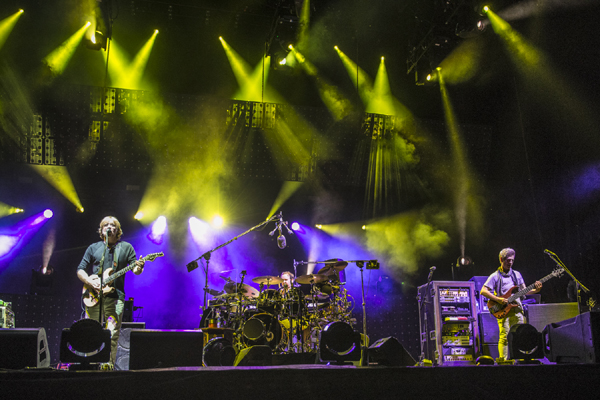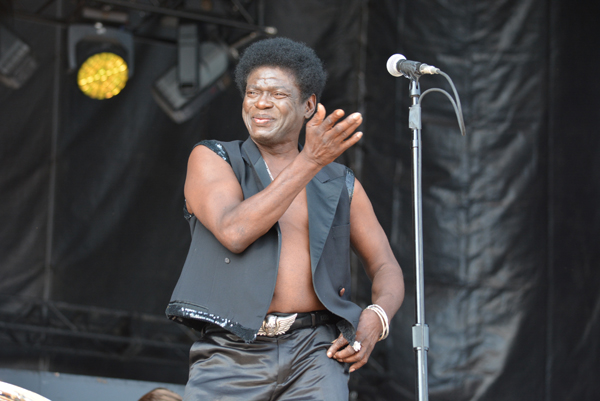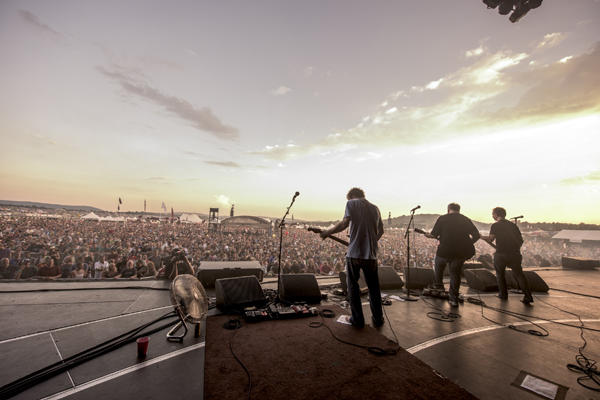From The _Lockn’ Times_: Blaze On

Phish en Fuego photo by Stuart Levine
.Phish and Ween first intersected on December 11, 1997, when The Vermont Quartet covered “Roses are Free” during a seamless second set at the War Memorial in Rochester, N.Y. Though covers have been a key part of Phish’s repertoire since their inception, that chilly late fall date arrived during a unique moment in the group’s evolution, as they widened their stylistic scope to include dirty funk, ambient space and other alternative sounds that fell outside the range of genres that defined their first 14 years. The cover choice had a profound impact on Ween too, introducing the New Hope, Pa. alt-rock band to a fresh, open-eared jamband audience who shared their oddball sense of humor and love of live theatrics. No longer simply known for their early ‘90s MTV clips, Ween attracted a new flock of fans to their shows, while “Roses are Free” blossomed into a welcome part of the Phish cannon—a never overplayed personification of their loose, late-‘90s groove. The jamband world itself was concurrently in the process of transitioning—incorporating a broader palette of bands and laying the groundwork for what would eventually come to be known as “festival nation.”
And, just under 19 years since Phish segued from The Who’s “Drowned” into “Roses are Free” for the first time, the Phish and Ween worlds experienced their most direct meetings—in a far warmer climate—here in Arrington, Va. last night. Mickey “Dean Ween” Melchiondo nodded to the quiet victory directly, noting that this was the first time the two groups had shared a bill, after Ween busted into a crisp, classic version of “Roses are Free” partway through their 70-plus minute performance.
It felt like the perfect place for those worlds to collide. As Widespread Panic bassist and event veteran Dave Schools mentioned in the Thursday edition of Lockn’ Times, this festival has always placed a great deal of emphasis not only on its own history, but also the improvisational music world’s lineage. Lockn’ was founded on the principle of highly collaborative performances. Both of the events’ producers have experience with the concept—Dave Frey brought the inter-band segue to the shed circuit with the inaugural H.O.R.D.E. tour in 1992 and Shapiro curated countless interlocking sets and band mash-ups while shepherding Wetlands and overseeing the Jammy Awards. Even though Trey Anastasio did not slide onstage with Ween—as many had guessed—and Phish didn’t bring out any special guests, the moment felt genuine
The day’s main stage musical festivities kicked off 12 hours before Phish wrapped-up at midnight with a short, spirited set from prog-improvisers Moogatu. Their performance, which peeked with a jam based around the Eagles’ “Hotel California” that bled into some Police-like reggae rock, closed another Lockn’ circle, too: the Washington, DC-based group originally won a spot on last year’s lineup through the Rockn’ to Lockn’ contest, but their slot was rained out. As the festival’s new rotating stage shifted right, Moogatu’s show quite literally turned into the first of two back-to-back funk performances. Brooklyn-based nine-piece Turkuaz were first at bat, offering a sweaty, high-energy hour that showcased both their brass section and their colorful costumes. They also honored their roots, closing their set with a well-placed cover of The Band’s “The Shape I’m In” sung by baritone saxophonist Josh Schwartz.
If Turkuaz are part of a new generation of Berklee-bred musicians who have gradually progressed through the jamband scene to headliner status grassroots style, then the day’s next funky act, Vulfpeck, are proof that some bands are adopted by group consensus. While they’ve been steadily gigging and recording for five years, during the past 12 months Vulfpeck have exploded from buzz-band to festival circuit staple, earning two slots at this year’s Lockn’. They fully embraced the weekend’s lighting-in-a-bottle spirit, inviting out Turkuaz tenor saxophonist Greg Sanderson near the start of their set, covering, The Band’s “Up on Cripple Creek” (sung by their drummer from behind the kit during the second half of the song in true Levon Helm-style), tackling Stevie Wonder’s “Boogie on Reggae Woman” and channeling a whimsical, antic-filled energy reminiscent of Phish themselves.

Charles Bradley likes Lockn’ photo by Dean Budnick
Likewise, the day’s next act, White Denim, represented a portion of the lineup that came through the ranks in a parallel scene and then, crossed into the Lockn’ family. While frontman vocalist/guitarist James Petralli cut his teeth listening to bands like Phish, Widespread Panic, Frank Zappa and the Allman Brothers Band, his band made their name playing proggy garage rock for indie-rock crowds. In recent years, the quartet has started to make waves on the jamband and festival circuits, comfortable places to showcase their guitar heroics and technical proficiency. They’ve also recently experienced some personnel changes with guitarist Austin Jenkins and drummer Josh Block leaving to focus on their work with Leon Bridges and other studio projects, and Friday’s show was only the retooled lineup’s sixth gig with new drummer Jordan Richardson (of Ben Harper’s Relentless7). Joe Russo’s Almost Dead/Wolf! guitarist Scott Metzger, whose original group RANA served as one of Wetlands final house bands, joined White Denim for the first time on their Stiff track “Ha Ha Ha Ha (Yeah)” and a new cover of Roxy Music’s “2HB” that gradually eased into some Garcia-like space. Next, soul singer Charles Bradley battled the heat with his Extraordinaires, offering no hints that he cancelled a series of dates earlier this month due to a minor medical procedure.
Though perceived as something of an outlier on this year’s lineup, J. Geils Band singer Peter Wolf won over an intimate Lockn’ crowd that included Melchiondo and Mike Gordon. After opening with a few cuts from his solo catalog, Wolf reinforced his deep ties to the San Francisco scene—including classic dates with the Grateful Dead and Jefferson Airplane and a more recent sit-in with Phil Lesh in his hometown of Boston—for an audience full of Ween and Phish fans who had never seen the singer live. His setlist boasted J. Geils Band originals like “Cry One More Time,” which he dedicated to Gram Parsons, “Start All Over Again,” “The Usual Place” and “Love Stinks” as well as John Lee Hooker’s “It Serves You Right to Suffer,” Moe Bandy’s “It Was Always So Easy (To Find an Unhappy Woman)” and Bill Monroe’s “When My Blue Moon Turns to Gold Again.” (Also of note: Wolf’s drummer Tom Arey actually helped Shapiro perfect his interlocking set concept at Wetlands during sweaty gigs with his old band Uncle Sammy.)

Ween at dusk photo by Jay Blakesberg
In contrast to their slightly darker and “browner” spot on Thursday, Ween loaded their pre-dusk concert with some of their best known cuts, including “The HIV Song,” “Your Party,” “Bananas and Blow,” “Voodoo Lady,” “Piss Up a Rope” and the before-mentioned “Roses Are Free.” (Anastasio took in a portion of the show sidestage.) Melchiondo was chatty before and between songs, introducing the opener “Pork Roll Egg and Cheese” as a song about a regional breakfast sandwich and dedicating “Touch My Tooter” to Glenn McClelland on the occasion of his birthday. Offstage, he also teased Phans by posing with a picture of one of Anastasio’s trademark Languedoc guitars on social media.
Phish eased into their first set with the chant-along “Wilson” and, after a false start, a fun “Down With Disease” and an animated “Free.” Following another festival favorite, “Wolfman’s Brother,” Phish offered the night’s first improvisational highlight during “Tube,” a song they have started to stretch toward its ‘90s prime this summer. The tune gently glided into the rolling Gordon/Scott Murawski Fuego cut “555,” the jazzy turns of “It’s Ice” and finally the piano-laced “Wingsuit.” The standalone “Simple” settled into a peaceful pocket, before the members of the group put down their instruments for an cappella take on David Bowie’s “Space Oddity” that they introduced earlier this summer.
However, Phish truly broke out of festival-showcase mode during their second set. The anthemic “Punch You In the Eye,” whose calypso “Landlady” section and dance routine energized the crowd, opened a long, seamless sequence of music that found its footing early on with a patient “Blaze On.” (The year-old, heavily hashtagged song’s similarities to “Man Smart (Woman Smarter)” bring back warm memories of Anastasio’s participation in last year’s Fare Thee Well event that Shapiro produced.) “Fuego,” another one of the band’s newer jam-vehicles, descended into an inspired “Ghost” and an unexpected second-set “Bathtub Gin” that morphed into a southern-rock boogie. The reunion hymn “Backwards Down the Number Line” and a tight “You Enjoy Myself,” which included quotes of the new Phish original “Ass Handed” brought things to a climax. An unusual “Character Zero,” which slowed down into a surprise bluesy breakdown, served as the evening’s lone encore.
From there, the crowd dispersed around the site. In the Woods, Neal Casal and his Circles Around the Sun project offered the live debut of the music they created for Fare Thee Well’s intermissions. Over in the Super VIP tent The Infamous Stringdusters offered their only solo set of the weekend. Meanwhile, in the Blue Bridge Bowl, Joe Russo’s Almost Dead played their second consecutive late-night show, with special guest Nicole Atkins making an appearance.
Bassist Dave Dreiwitz, who pulled double duty two nights in a row with Almost Dead and Ween, cemented his place as the “hardest working man at Lockn’” and the day even came full circle musically: Just 24-hours earlier, Joe Russo’s Almost Dead pushed toward sunrise with an instant classic performance that included a Benevento/Russo jam during “The Wheel” and full “Terrapin Suite” that reminded all in attendance that the Lockn’ lineage will continue to evolve for years to come.
.



















